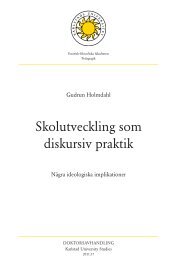FULLTEXT01
FULLTEXT01
FULLTEXT01
Create successful ePaper yourself
Turn your PDF publications into a flip-book with our unique Google optimized e-Paper software.
and that one always has the option to withdraw without any furtherexplanations and under no circumstances negative consequences. In acollaboration project of the kind that I participated in, it is accustomed thatresearch principals and research managers ensure that this kind of informationis communicated in advance, and that informed consent is established betweenthe representatives of the various parties involved. It should also be agreed thatinvolvement takes place within normal working hours (Swedish ResearchCouncil, 2011). However, even so, there might be a dilemma when it comes tothe informed consent requirement. If individuals among the school personneloppose to participate in such an effort, that is, although the project is said toproceed within normal working hours, it may to some extent, be labeled as aproblem, rather than respected as the reasonable consequence of the consentrequirement. A further dilemma is that despite necessary information has beengiven about a research project, it may be difficult for participants to predict theconsequences of one's own participation, such as how it can affect one tosubsequently find himself quoted in an academic context (Wehterell, 2001).Participants must be assured confidentiality for example by me changing theirnames, and also excluding information in the text excerpts and statementswhich in any way may identify people (Swedish Research Council, 2002;Wetherell, 2001). However, it can be difficult to fully meet the requirement toremove information that might identify the participants. Foremost it can bedifficult in an extensive co-funded, collaboration project with many actorsinvolved. For all those who have been part of, or who have had informationabout the project in question, and these are quite a few people, it can be rathereasy to deduce various facts to specific municipalities, authorities or evenpersons in the project. Examples would be data that is of great value to theactual study, but which, for those familiar with the case, can be traced to any ofthe actors involved. Therefore, it must, be emphasized that the purpose of thisstudy is to highlight the ideological implications of the discursive practice. Thepurpose is by no means to identify in which extent individual „actors‟ maycontribute to this, or to in any negative way, point out one or the other.As an ideology analysis of the kind I conduct is more of a generative process,the way to understand research data cannot be overseen from start. Even if itwas possible, it is not necessarily relevant to in detail and continuously informthe participants about the theoretical outline and objectives of the study(Wetherell, 2001). According to the Swedish Research Council's (2002) Researchethics recommendations, the value „of the expected knowledge contribution should180






